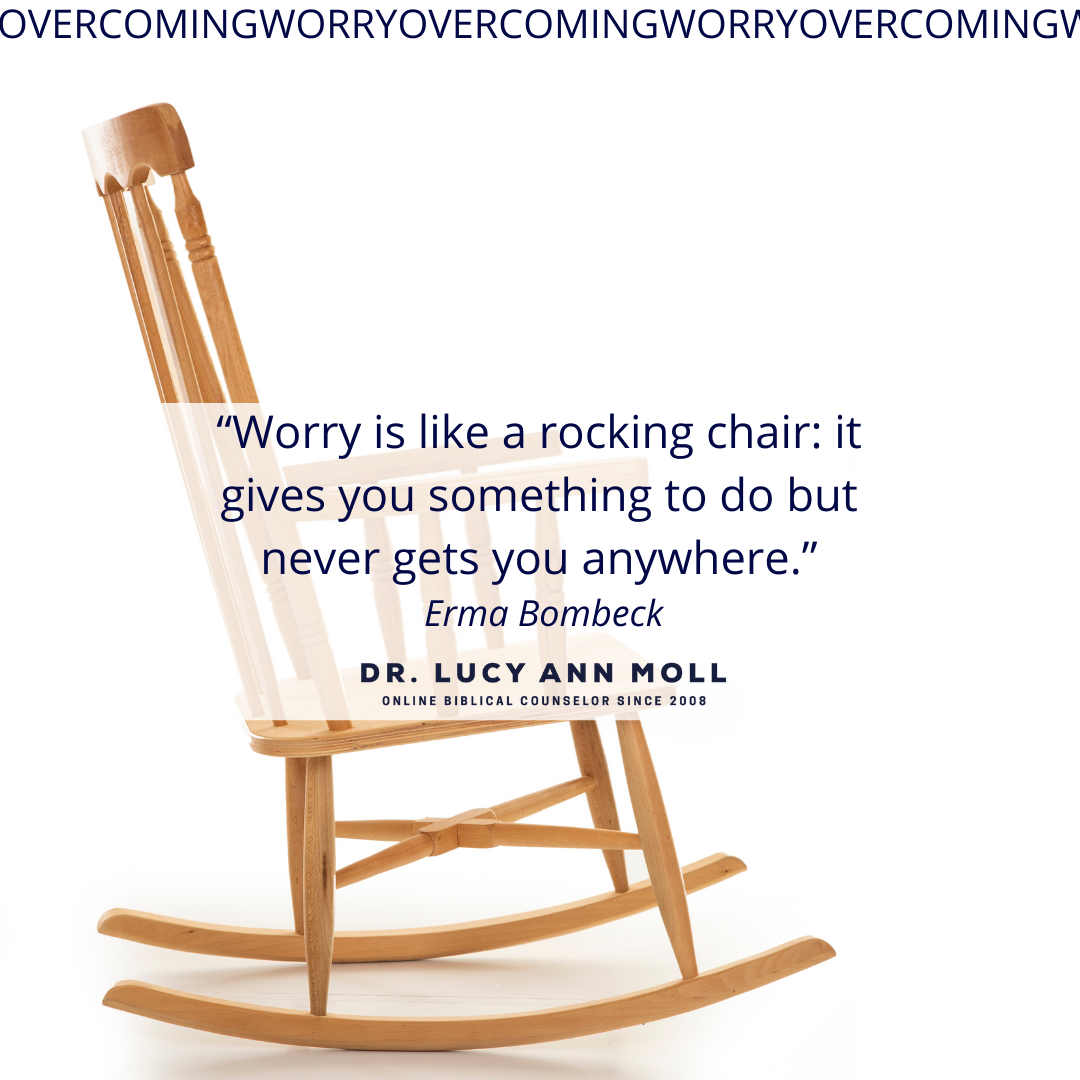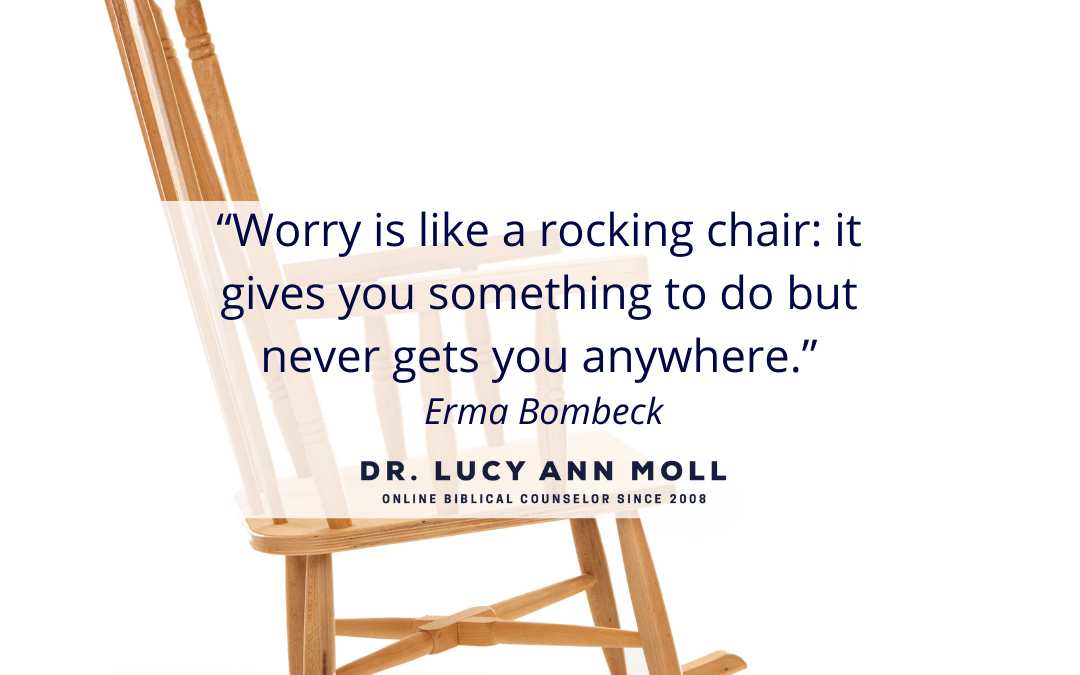Overcoming worry: Who doesn’t want help and hope for recurring, anxious thoughts?
Worriers meditate very well … on the wrong things! Here is an action plan for overcoming worry. This article appeared first here at the Biblical Counseling Coalition website.

My mother-in-law is an expert worrier. She worries about the weather. She worries about dinner turning out alright. And she worries that my husband and I will get home in one piece.
Worry fills one’s thoughts with apprehension. It can keep a person up at night. It also seems second nature, right? Seriously, who does not worry at least some of the time?
Perhaps Erma Bombeck was right all along when she said, “Worry is like a rocking chair: it gives you something to do but never gets you anywhere.”[1]
Worry Defined
Worry is handwringing while overthinking. It is an anxious response to one of life’s many trials (John 16:33). The word worry from Old English is wyrgan, which means “to choke” or “strangle.”
The parable of the sower nails the downside of this type of fear. “The worries of this life, the deceitfulness of wealth, and the desires for other things come in and choke the word, making it unfruitful,” (Mark 4:19). The worries of this life distract us from the gospel, for certain.
 While it demonstrates a lack of faith, ordinary worry that most of us experience does not result in significant impairment: someone who worries can still hold down a job, study for exams, put a finishing touch on a sermon, and so forth.
While it demonstrates a lack of faith, ordinary worry that most of us experience does not result in significant impairment: someone who worries can still hold down a job, study for exams, put a finishing touch on a sermon, and so forth.
In contrast, debilitating worry that results in distress/disability (and often muscular tension and physical complaints) is an essential feature of Generalized Anxiety Disorder (GAD). Statistics estimate that GAD affects 6.8 million people, or 3.8 percent, in the United States in any given year; women are twice as likely to have this diagnosis.[2]“Everything” causes them to worry—health, work, family, school, money. They dread each day.
But God …
God lovingly urges us to worry about nothing. We all know this cornerstone verse on handling anxiety. “The Lord is at hand; do not be anxious about anything, but in everything by prayer and supplication with thanksgiving, let your requests be made known to God” (Phil. 4:5-6).
The temptation to worry can be overcome as we trust God in all circumstances. As we trust Him and desire to please Him (Matt. 6:25-34), we focus less and less on ourselves and our cares. We grow in believing God’s promise to provide for all of our needs. We reach out to help others.
So, how do we practically overcome worry?
Anti-Worry Action Plan
The biblical solution to worry sets squarely on what we think and do, and at its heart is self-counsel. “What we say to ourselves controls much of what we do, whether right or wrong, true or false, which is the fruit of what we believe,” writes Paul Tautges.[3]
This self-counsel helps us reject lies and speak biblical truths to ourselves about God, ourselves, and our circumstances. Here are components of an action plan that we might use to teach ourselves and our counselees how to think and act biblically.[4]
Think Biblically
- Remember God’s promise to care for you whatever your circumstance. Review Psalm 23, Matthew 6:25-34, and Luke 12:22-34. Choose one passage to memorize and meditate upon.
- Ask God for His help to change your pattern of worrisome thoughts. Memorize 1 Thessalonians 5:17. Review Hebrews 4:15.
- Determine to think on things that please the Lord (Phil. 4:8). When worrisome thoughts invade (as often they do), replace them with faith-filled thoughts. Here is help on how to do this.
- Daily review simple yet profound truths that counter worry. Here are three based on Matthew 6:25-35. (Read 11 more of these truths here.)
- God commands me not to worry; worry is sin (vv. 25, 34).
- God provides all of our material needs (v. 33).
- Today has enough trouble; there’s no sense to borrow more from tomorrow (v. 34).
Act Biblically
- Pray always with thanksgiving (Phil. 4:6; 1 Thess. 5:17).
- Bless others with tangible and genuine expressions of biblical love and service.
- Regardless of how you feel, do what you know is right (Rom. 12:1) and view your circumstance as an opportunity to grow spiritually because God works all things together for good in your life (Ps. 37; Rom. 8:28-29; Phil. 1:6).
In Summary
Worry is anxious fretting about something that has not yet happened. It reveals mistrust in God. By worrying, we may feel in control. We may actually rely on it to provide a false sense of security.
Corrie Ten Boom once said, “Worry does not empty tomorrow of its sorrow. It empties today of its strength.”[5]
To that end, let us turn to God for true peace and rest (Matt. 11:28-30). As we repent of worry and follow a Bible-based action plan, we will see practical change in our lives.
Question for Reflection
- What types of worry fill your thoughts or those of your counselees? Finances? Health? Work? Family?
- How might prayer help you or your counselees to express worry-free contentment? Here are two examples: “Jesus, help me to trust you with my future rather than become anxious about my job.” “Jesus, when I am tempted to worry, help me to practically love the people around me.”
[1] Erma Bombeck Quotes, Goodreads, accessed May 27, 2021, https://www.goodreads.com/quotes/140315-worry-is-like-a-rocking-chair-it-gives-you-something.
[2] “Generalized Anxiety Disorder,” Anxiety and Depression Association of America, accessed May 27, 2021, https://adaa.org/understanding-anxiety/generalized-anxiety-disorder-gad.
[3] Paul Tautges, “14 Daggers that Help Kill Worry,” Biblical Counseling Coalition, December 2, 2014, accessed May 27, 2021, https://www.biblicalcounselingcoalition.org/2014/12/02/14-daggers-that-help-to-kill-worry/.
[4] This action plan draws majorly from John C. Brogan’s Self-Confrontation: A Manual for In-Depth Discipleship.
[5] Corrie Ten Boom, Clippings from my Notebook, (Thomas Nelson Inc., 1982).
Find GOD's Freedom from Anxiety
Get My FREE Anxiety Helper Pack!
Choice is a wonderful gift from God. You do NOT have to be stuck in self-focused anxiety. You can find God’s freedom.




Keep up your good work Lucyann
Thanks, Larry! I remember my Toastmasters days well. 😃